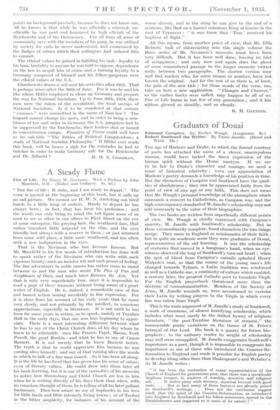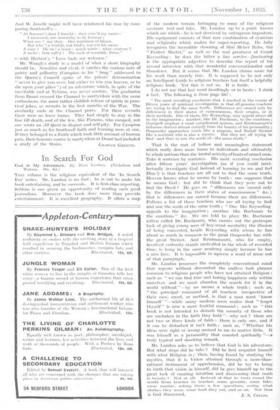Graduates of Douai
Tim age of Marlowe and Drake, to which the formal courtesy of poets has attached the name of a clever, unscrupulous woman, would have lacked the finest expression of the
hinnan spirit without the Douai martyrs. If we are to be fair to Drake's character and courage, we need a
sense of historical relativity : even our appreciation of Marlowe's poetry demands a knowledge of his position in time. But the characters of Campion and Southwell have the quali- ties of absoluteness ; they can be appreciated fairly from the point of view of any age or any faith. This does not mean` that Mr. Waugh's personal knowledge of the atmosphere which surrounds a convert to Catholicism, as Campion was, and the high contemporary standard of M. Janelle's scholarship may not add immensely to the value of their biographies.
The two books are written from superficially different points of view. Mr. Waugh is chiefly concerned with Campion's sanctity, M. Janelle with Southwell's scholarship. But in these extraordinarily complete, fused characters the two things merge. They came to England as missionaries of their faith ; but in quite an academic sense they were graduates of Douai, representatives of the old learning. It was the scholarship of centuries that moved in a hangman's hand, when an eye- witness observed the leap of Southwell's torn-out heart ; when the spot of blood from Campion's entrails splashed Henry Walpole's coat, so that the course of the young man's life changed towards Tyburn, a Latin tradition was reinforced
as well as a Catholic one, a continuity of culture which enabled, a century later, the greatest Catholic poet to translate Virgil. For the English prayerbook threatened more than the doctrine of transubstantiation. Members of the Society of
Jesus, M. Janelle reminds us, were accustomed to exercise their Latin by writing prayers to the Virgin in which every
line was ,taken from Virgil.
This is the main argument of M. Janelle's study of Southwell, a work of enormous, of almost horrifying scholarship, which includes what must surely be the dullest byway of religious literature, " the post-Trentine literature of remorse," the innumerable poetic variations on the theme of St. Peter's betrayal of Our Lord. His book is a quarry for future bio- graphers ; to the ordinary reader its weight of scholarship may well seem misapplied. M. Janelle exaggerates Southwell's importance as a poet, though it is impossible to exaggerate his importance as one of those who introduced the Counter-Re- formation to England and made it possible for English poetry to develop along other lines than Shakespeare's and Webster's. As M. Janelle writes :
" It has been the contention of many representatives of the Church of England for generations past, that thoro was a specifically Anglican temper, in matters of worship, devotion and religious art. . . It unites piety with decency, mystical fervour with good taste. . . But in fact many of these features are already joined in Southwell's writings. . . . D'oes not the conclusion suggest itself, that the spirit of the Counter-Reformation, as introduced into England by Southwell and his fellow-missioners, spread to the Establishment and imparted to it some of its nature 1 "
And M. Janelle might well have reinforced his case by coin- paring Southwell's-
" At Sorrowo's door I knockt : they erav'd my name : I answered, one unworthy to be known° :
What one ? say they. One worthiest of blame. But who ? a wretch, not God's, nornyet his owns.
A man ? Oh no ! a beast : much worse : what creature ?
A rock() : how call'd ? The rock of scandale, Peter."
.--with Herbert's " Love bade me welcome."
Mr. Waugh's study is a model of what a short biography
should be. Sensitive and vivid, it catches the curious note of gaiety and gallantry (Campion in his " brag " addressed to
the Queen's Council spoke of the priests' determination " never to give you over, but either to win you heaven, or to die upon your pikes ") of an adventure which, in spite of the inevitable end at Tyburn, was never sombre. The graduates :from Douai crossed the Channel to martyrdom with the same enthusiasm, the same rather childish release of spirits in prac- tical jokes, as recruits in the first months of the War. The similarity ends at the Channel ports. For these recruits there were no leave trains, They had simply to stay in the
line till death, and of the few, like Parsons, who escaped, not one wrote an All Quid in disgust and self-pity. For Campion just as "much as for Southwell faith and learning were at one. If they belonged to a Faith which took little account of human pain, their honours course in martyrdom at Douai had included



























































 Previous page
Previous page